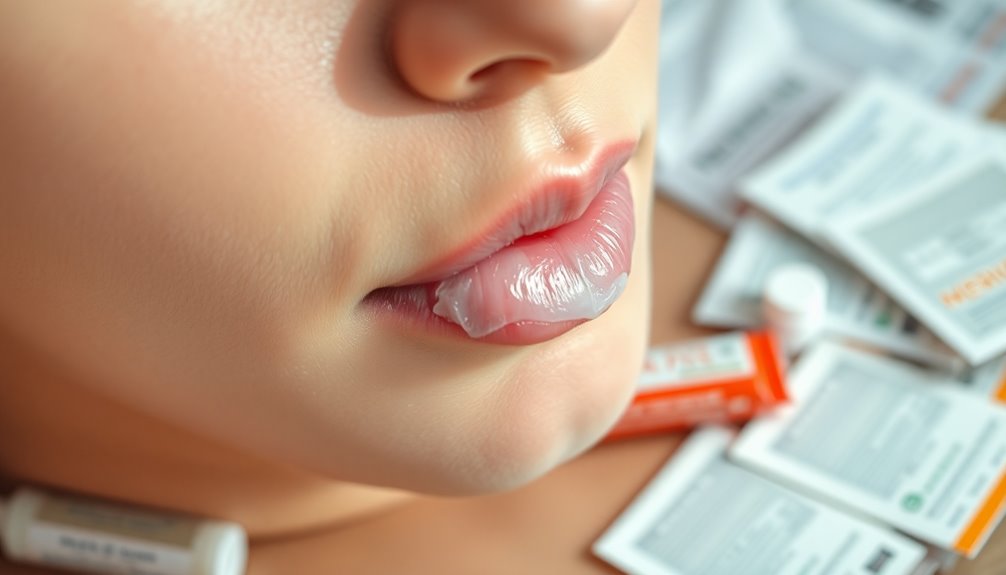Cold sores during pregnancy, caused by the herpes simplex virus type 1 (HSV-1), can increase risks for both you and your baby. Weakening immunity might trigger outbreaks, and active sores during delivery can lead to serious complications. Fortunately, treatments like acyclovir can help manage symptoms later in pregnancy. Practicing strict hygiene is vital to prevent spreading the virus to your newborn. Want to know more about safe practices and treatment options? Continue exploring this topic for essential insights!
Key Takeaways
- Cold sores during pregnancy are common due to weakened immunity, with outbreaks lasting 1-2 weeks and sometimes being more severe.
- Active outbreaks increase the risk of neonatal herpes, particularly if it's the mother's first infection during the third trimester.
- Treatment options include over-the-counter acyclovir cream and prescription antivirals like acyclovir or valaciclovir, especially after week 36.
- Strict hygiene practices are crucial to prevent transmission, including handwashing and avoiding close contact with the newborn during outbreaks.
- Breastfeeding is safe if precautions are taken; avoid direct feeding from the affected breast and express milk instead.
Understanding Cold Sores: What You Need to Know

When you're pregnant, it's important to understand that cold sores, mainly caused by the herpes simplex virus type 1 (HSV-1), can become more frequent and severe.
Your immune system is naturally weakened during pregnancy, making you more susceptible to outbreaks. Approximately 80% of adults carry HSV-1, which can reactivate due to stress, fatigue, or hormonal changes.
Pregnancy weakens your immune system, increasing susceptibility to cold sore outbreaks, especially among the 80% of adults carrying HSV-1.
While cold sores typically last 1-2 weeks, their severity may increase during this time. First-time HSV infections, especially in the third trimester, pose risks to your newborn.
Fortunately, there are treatment options available, including over-the-counter acyclovir cream and prescription antiviral medications like acyclovir or valaciclovir.
Always consult your healthcare provider before using any treatment to guarantee it's safe for you and your baby.
The Role of HSV in Cold Sores

Although many people associate cold sores primarily with oral outbreaks, the herpes simplex virus type 1 (HSV-1) plays an essential role in their development and transmission. This highly contagious virus is responsible for about 80% of cold sore infections globally.
You can contract HSV-1 by transmitting the virus through skin contact, sharing personal items, or kissing, especially during an active outbreak. While it's most commonly linked to oral herpes, it can also lead to genital herpes through oral-genital contact.
Once you're infected, HSV remains dormant in your body, potentially reactivating due to triggers such as stress, fatigue, or hormonal changes—common experiences during pregnancy.
Being aware of HSV-1's role is vital for managing cold sores effectively.
Symptoms of Cold Sores During Pregnancy

Cold sores during pregnancy can be uncomfortable and distressing, especially given the physical changes and stress you may already be experiencing.
Caused by the herpes simplex virus (HSV-1), these cold sores typically manifest as small, fluid-filled blisters around your mouth and lips. Before the blisters appear, you might notice symptoms like itching, tingling, or burning sensations. These early signs can last a few days, often followed by the blisters themselves, which usually take 1-2 weeks to heal.
Additionally, hormonal fluctuations, fatigue, and stress during pregnancy may increase the frequency and severity of outbreaks. If a cold sore lingers beyond 10 days or comes with unusual symptoms, it's important to reach out to your healthcare provider for guidance.
Impact of Cold Sores and Genital Herpes on Pregnancy

Cold sores and genital herpes can pose serious risks during pregnancy, especially when it comes to transmission to your baby.
It's crucial to know your treatment options and preventive measures to guarantee your newborn stays safe.
Risks of Transmission
When considering the risks of transmission during pregnancy, it's essential to understand how cold sores and genital herpes can impact both mother and baby.
Cold sores, primarily caused by the herpes virus HSV-1, and genital herpes, mainly caused by HSV-2, pose significant risks, especially if you experience a first-time infection.
If you have an active outbreak during delivery, the risk of neonatal herpes increases, putting your baby at serious risk. First-time infections in the third trimester can lead to complications, so timely medical consultation is imperative.
Although most babies born to mothers with a history of HSV remain unaffected, strict hygiene practices are necessary to prevent transmission from caregivers with cold sores.
Always seek immediate medical attention if your baby shows signs of HSV.
Treatment Options Available
Managing cold sores during pregnancy is essential to protect both you and your baby.
While cold sores are caused by the herpes simplex virus (HSV), there are effective treatment options available. Always consult your healthcare provider before starting any treatment, but consider these options:
- Over-the-counter aciclovir cream for topical relief
- Prescription antiviral medicines like aciclovir or valaciclovir
- Maintaining strict hygiene to prevent spreading the virus
- Discussing preventative measures with your healthcare provider
Preventive Measures for Infants
How can you guarantee your infant stays safe from herpes infections?
It's vital to adopt effective preventive measures for infants. Cold sores can easily transmit herpes, so if you have an outbreak, always wear a mask and wash your hands thoroughly before touching your baby.
Most infants born to HSV-positive mothers remain unaffected, but maintaining strict hygiene is imperative.
If you're experiencing an active genital herpes outbreak during delivery, consult your healthcare provider about the possibility of a cesarean delivery to reduce the risk of neonatal herpes.
Be vigilant for early signs in your infant, like blisters or poor feeding, as immediate medical attention can greatly improve outcomes.
Protecting your baby starts with awareness and proactive care.
When to Consult Your Doctor

If you notice your newborn showing any signs of HSV, such as blisters or fever, contact your doctor right away.
Additionally, if your cold sore lasts longer than 10 days or keeps coming back, it's important to seek medical advice.
Early intervention can help protect both you and your baby from potential complications.
Symptoms in Newborns
While monitoring your newborn for signs of illness, it's important to be aware of symptoms that could indicate herpes infection. Early recognition can lead to timely treatment, especially since some symptoms of herpes in newborns can mimic common issues.
- Blisters or skin sores
- Fever or lethargy
- Seizures or irritability
- Poor feeding or jaundice
If your newborn exhibits any of these signs, don't hesitate to consult your doctor immediately.
Prompt evaluation is vital to rule out birth-acquired herpes, particularly if there's a known history of herpes simplex virus in the family. Your vigilance can help protect your unborn baby and guarantee they receive the care they need.
Persistent Cold Sores
Persistent cold sores during pregnancy can be concerning, so knowing when to consult your doctor is essential.
If your cold sore lasts longer than 10 days, it's important to seek medical advice to evaluate potential complications. Frequent outbreaks may signal a need for a tailored management plan.
If you experience your first HSV infection while pregnant, seek immediate medical attention due to the heightened risk of transmission to your newborn.
Additionally, if you notice symptoms like blisters, fever, or poor feeding in your baby, contact your healthcare provider right away.
Always inform your doctor about any cold sore occurrences during your pregnancy, as they can recommend common treatments for cold sores and preventive measures to protect both you and your baby.
Treatment Options for Cold Sores in Pregnant Women

When dealing with cold sores during pregnancy, it's essential to explore safe treatment options that won't compromise your health or that of your baby.
Exploring safe treatment options for cold sores during pregnancy is crucial for your health and your baby's well-being.
Here are some effective options to take into account:
- Acyclovir cream: An over-the-counter antiviral treatment generally regarded as safe.
- Acyclovir or Valacyclovir: These oral medications may be prescribed, especially after week 36, to manage outbreaks and reduce the risk of herpes during pregnancy.
- Docosanol (Abreva): A common over-the-counter treatment, but consult your healthcare provider for safety.
- Avoid Famciclovir: This medication isn't recommended due to insufficient safety data.
Always discuss your symptoms and treatment for cold sores with your healthcare provider to guarantee the safest approach during your pregnancy. Additionally, maintaining hydration levels can support your overall health during this time.
Protecting Your Baby From Herpes Transmission

To protect your baby from herpes transmission, practicing strict hygiene is essential.
Always wash your hands and avoid close contact if you or someone around you has a cold sore.
Keeping your little one safe starts with being aware of potential risks and taking proactive steps.
Hygiene Practices
Since strict hygiene practices are vital in preventing herpes transmission to your newborn, it's imperative to be proactive in maintaining a safe environment.
Here are some essential steps you should follow:
- Wash your hands frequently, especially before handling your baby.
- Avoid kissing your newborn if you have cold sores.
- Wear a mask if you have an active outbreak and must be near the baby.
- Inform all caregivers about the importance of hygiene practices to prevent herpes transmission.
Minimize Contact Risks
Minimizing contact risks is essential for protecting your baby from herpes transmission, especially during an active outbreak. Caregivers should avoid touching cold sores and refrain from kissing the baby. Here are some key practices to follow:
| Action | Importance |
|---|---|
| Wash hands frequently | Reduces transmission risk |
| Wear a mask if infected | Limits close contact with baby |
| Express milk if sores are present | Guarantees safe breastfeeding |
Breastfeeding Considerations With Cold Sores

While breastfeeding is generally safe for mothers with cold sores, there are important precautions to contemplate. The virus doesn't transmit through breast milk, but you should take steps to protect your baby.
Here are some key considerations:
- Avoid breastfeeding directly from the affected breast until the cold sore has crusted over.
- Express milk from the sore side and feed from the unaffected breast.
- Always wash your hands thoroughly and wear a mask when handling your baby.
- Inform your healthcare provider about your cold sores for tailored advice.
Taking these precautions can help minimize the risk of transmission while ensuring your breastfeeding journey remains safe and enjoyable for both you and your little one.
Complications Associated With HSV in Newborns

Complications from herpes simplex virus (HSV) in newborns can be severe and life-threatening, particularly if a mother contracts the virus for the first time during her third trimester.
The transmission of HSV can lead to neonatal herpes, which may result in serious complications such as skin infections, breathing difficulties, and neurological issues like seizures or encephalitis.
Newborns affected by disseminated herpes often show symptoms like hypothermia, poor feeding, and lethargy, requiring immediate medical attention.
While early diagnosis and treatment can improve outcomes, systemic herpes or encephalitis often leads to poor prognoses.
Additionally, newborns infected with HSV may face long-term complications, including developmental delays and learning disabilities, highlighting the importance of preventive measures for mothers with known HSV infections.
Resources for Support and Information

When you're steering through the challenges of managing cold sores during pregnancy, having access to reliable resources can make a significant difference.
These resources for support and information can help you understand herpes simplex virus (HSV) and its implications during pregnancy, ensuring you can take proactive steps to prevent complications.
- Australian Herpes Management Forum: Offers extensive guidelines and support.
- American Pregnancy Association: Provides educational materials on HSV's impact on pregnancy.
- CDC: Contains detailed information on herpes transmission and recommendations for pregnant individuals.
- Online Communities: Platforms like BabyCenter and What to Expect let you connect with others facing similar challenges.
Utilizing these resources can empower you to navigate your pregnancy confidently while managing HSV effectively.
Frequently Asked Questions
How Do You Treat Cold Sores While Pregnant?
If you're dealing with cold sores during pregnancy, start by keeping the affected area clean.
You can use over-the-counter treatments like acyclovir cream, but it's best to consult your healthcare provider first. They might prescribe oral antivirals like acyclovir or valacyclovir if necessary.
Avoid touching the sores to prevent spreading the virus.
If cold sores last more than 10 days or recur frequently, reach out to your doctor for guidance.
What Is the New Treatment for Cold Sores?
Imagine a world where cold sores vanish with a simple swipe.
While there's no groundbreaking new treatment, options like acyclovir cream and oral antivirals remain the go-to choices. Acyclovir's been around, but it's safe and effective, especially during pregnancy.
You might also consider docosanol, but check with your doctor first.
What if I Accidentally Kissed My Baby With a Cold Sore?
If you accidentally kissed your baby with a cold sore, it's important to stay calm.
Watch for any symptoms like blisters, fever, or poor feeding, and contact a healthcare provider if you notice anything unusual.
You should avoid kissing the baby or touching the sore, and wash your hands thoroughly before handling them.
If you're breastfeeding, consider expressing milk from the unaffected breast to continue feeding safely.
Prioritize hygiene to protect your little one.
What Hormones Trigger Cold Sores?
Picture your body as a finely tuned orchestra, where hormones like estrogen and progesterone are the conductors. When these levels rise, they can disrupt your immune system's harmony, making you more vulnerable to cold sores.
Stress and fatigue, often accompanying hormonal shifts, play their own dissonant notes, triggering outbreaks. By understanding how these hormonal changes impact you, you can better manage and even prevent those pesky cold sore flare-ups.
Conclusion
In the journey of pregnancy, dealing with cold sores can feel like maneuvering through a stormy sea. Just as a sailor must know how to weather the waves, you need to understand HSV and its effects. By staying informed and consulting your doctor, you can protect both yourself and your baby. Remember, knowledge is your lighthouse, guiding you safely to shore. Don't hesitate to seek support; you're not alone on this voyage.









